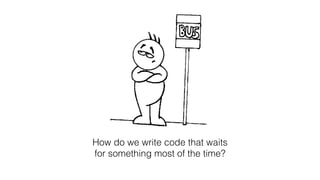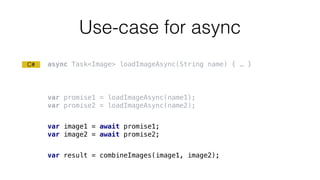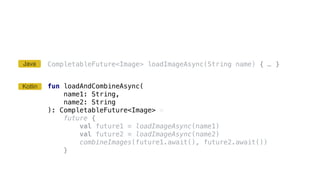Introduction to Coroutines @ KotlinConf 2017
- 1. elizarov at JetBrains Roman Elizarov Introduction to Coroutines
- 3. How do we write code that waits for something most of the time?
- 4. A toy problem Kotlin fun requestToken(): Token { // makes request for a token & waits return token // returns result when received } 1
- 5. fun requestToken(): Token { … } fun createPost(token: Token, item: Item): Post { // sends item to the server & waits return post // returns resulting post } A toy problem 2 Kotlin
- 6. fun requestToken(): Token { … } fun createPost(token: Token, item: Item): Post { … } fun processPost(post: Post) { // does some local processing of result } A toy problem 3 Kotlin
- 7. fun requestToken(): Token { … } fun createPost(token: Token, item: Item): Post { … } fun processPost(post: Post) { … } A toy problem fun postItem(item: Item) { val token = requestToken() val post = createPost(token, item) processPost(post) } 1 2 3 Can be done with threads! Kotlin
- 8. fun requestToken(): Token { // makes request for a token // blocks the thread waiting for result return token // returns result when received } fun createPost(token: Token, item: Item): Post { … } fun processPost(post: Post) { … } Threads fun postItem(item: Item) { val token = requestToken() val post = createPost(token, item) processPost(post) } Is anything wrong with it?
- 9. How many threads we can have? 100 🙂
- 10. How many threads we can have? 1000 😅
- 11. How many threads we can have? 10 000 😩
- 12. How many threads we can have? 100 000 😵
- 13. Callbacks to the rescue Sort of …
- 14. Callbacks: before fun requestToken(): Token { // makes request for a token & waits return token // returns result when received } 1
- 15. Callbacks: after fun requestTokenAsync(cb: (Token) -> Unit) { // makes request for a token, invokes callback when done // returns immediately } 1 callback
- 16. Callbacks: before fun requestTokenAsync(cb: (Token) -> Unit) { … } fun createPost(token: Token, item: Item): Post { // sends item to the server & waits return post // returns resulting post } 2
- 17. Callbacks: after fun requestTokenAsync(cb: (Token) -> Unit) { … } fun createPostAsync(token: Token, item: Item, cb: (Post) -> Unit) { // sends item to the server, invokes callback when done // returns immediately } 2 callback
- 18. Callbacks: before fun requestTokenAsync(cb: (Token) -> Unit) { … } fun createPostAsync(token: Token, item: Item, cb: (Post) -> Unit) { … } fun processPost(post: Post) { … } fun postItem(item: Item) { val token = requestToken() val post = createPost(token, item) processPost(post) }
- 19. Callbacks: after fun requestTokenAsync(cb: (Token) -> Unit) { … } fun createPostAsync(token: Token, item: Item, cb: (Post) -> Unit) { … } fun processPost(post: Post) { … } fun postItem(item: Item) { requestTokenAsync { token -> createPostAsync(token, item) { post -> processPost(post) } } } aka “callback hell” This is simplified. Handling exceptions makes it a real mess
- 21. Futures: before fun requestTokenAsync(cb: (Token) -> Unit) { // makes request for a token, invokes callback when done // returns immediately } 1
- 22. Futures: after fun requestTokenAsync(): Promise<Token> { // makes request for a token // returns promise for a future result immediately } 1 future
- 23. Futures: before fun requestTokenAsync(): Promise<Token> { … } fun createPostAsync(token: Token, item: Item, cb: (Post) -> Unit) { // sends item to the server, invokes callback when done // returns immediately } 2
- 24. Futures: after fun requestTokenAsync(): Promise<Token> { … } fun createPostAsync(token: Token, item: Item): Promise<Post> { // sends item to the server // returns promise for a future result immediately } future 2
- 25. Futures: before fun requestTokenAsync(): Promise<Token> { … } fun createPostAsync(token: Token, item: Item): Promise<Post> … fun processPost(post: Post) { … } fun postItem(item: Item) { requestTokenAsync { token -> createPostAsync(token, item) { post -> processPost(post) } } }
- 26. Futures: after fun requestTokenAsync(): Promise<Token> { … } fun createPostAsync(token: Token, item: Item): Promise<Post> … fun processPost(post: Post) { … } fun postItem(item: Item) { requestTokenAsync() .thenCompose { token -> createPostAsync(token, item) } .thenAccept { post -> processPost(post) } } Composable & propagates exceptions No nesting indentation
- 27. Futures: after fun requestTokenAsync(): Promise<Token> { … } fun createPostAsync(token: Token, item: Item): Promise<Post> … fun processPost(post: Post) { … } fun postItem(item: Item) { requestTokenAsync() .thenCompose { token -> createPostAsync(token, item) } .thenAccept { post -> processPost(post) } } But all those combinators…
- 28. Kotlin coroutines to the rescue Let’s get real
- 29. Coroutines: before fun requestTokenAsync(): Promise<Token> { // makes request for a token // returns promise for a future result immediately } 1
- 30. Coroutines: after suspend fun requestToken(): Token { // makes request for a token & suspends return token // returns result when received } 1
- 31. Coroutines: after suspend fun requestToken(): Token { // makes request for a token & suspends return token // returns result when received } 1 natural signature
- 32. Coroutines: before suspend fun requestToken(): Token { … } fun createPostAsync(token: Token, item: Item): Promise<Post> { // sends item to the server // returns promise for a future result immediately } 2
- 33. Coroutines: after suspend fun requestToken(): Token { … } suspend fun createPost(token: Token, item: Item): Post { // sends item to the server & suspends return post // returns result when received } 2
- 34. Coroutines: before suspend fun requestToken(): Token { … } suspend fun createPost(token: Token, item: Item): Post { … } fun processPost(post: Post) { … } fun postItem(item: Item) { requestTokenAsync() .thenCompose { token -> createPostAsync(token, item) } .thenAccept { post -> processPost(post) } }
- 35. Coroutines: after suspend fun requestToken(): Token { … } suspend fun createPost(token: Token, item: Item): Post { … } fun processPost(post: Post) { … } suspend fun postItem(item: Item) { val token = requestToken() val post = createPost(token, item) processPost(post) }
- 36. Coroutines: after suspend fun requestToken(): Token { … } suspend fun createPost(token: Token, item: Item): Post { … } fun processPost(post: Post) { … } suspend fun postItem(item: Item) { val token = requestToken() val post = createPost(token, item) processPost(post) } Like regular code
- 37. Coroutines: after suspend fun requestToken(): Token { … } suspend fun createPost(token: Token, item: Item): Post { … } fun processPost(post: Post) { … } suspend fun postItem(item: Item) { val token = requestToken() val post = createPost(token, item) processPost(post) } suspension points
- 38. • Regular loops Bonus features for ((token, item) in list) { createPost(token, item) }
- 39. • Regular exception handing Bonus features try { createPost(token, item) } catch (e: BadTokenException) { … }
- 40. • Regular higher-order functions • forEach, let, apply, repeat, filter, map, use, etc Bonus features file.readLines().forEach { line -> createPost(token, line.toItem()) } Everything like in blocking code
- 42. Retrofit async interface Service { fun createPost(token: Token, item: Item): Call<Post> }
- 43. Retrofit async interface Service { fun createPost(token: Token, item: Item): Call<Post> } future
- 44. Retrofit async interface Service { fun createPost(token: Token, item: Item): Call<Post> } suspend fun createPost(token: Token, item: Item): Post = serviceInstance.createPost(token, item).await()
- 45. Retrofit async interface Service { fun createPost(token: Token, item: Item): Call<Post> } suspend fun createPost(token: Token, item: Item): Post = serviceInstance.createPost(token, item).await() natural signature
- 46. Retrofit async interface Service { fun createPost(token: Token, item: Item): Call<Post> } suspend fun createPost(token: Token, item: Item): Post = serviceInstance.createPost(token, item).await() Suspending extension function from integration library
- 48. val post = createPost(token, item)
- 49. Higher-order functions val post = retryIO { createPost(token, item) }
- 50. Higher-order functions val post = retryIO { createPost(token, item) } suspend fun <T> retryIO(block: suspend () -> T): T { var curDelay = 1000L // start with 1 sec while (true) { try { return block() } catch (e: IOException) { e.printStackTrace() // log the error } delay(curDelay) curDelay = (curDelay * 2).coerceAtMost(60000L) } }
- 51. Higher-order functions val post = retryIO { createPost(token, item) } suspend fun <T> retryIO(block: suspend () -> T): T { var curDelay = 1000L // start with 1 sec while (true) { try { return block() } catch (e: IOException) { e.printStackTrace() // log the error } delay(curDelay) curDelay = (curDelay * 2).coerceAtMost(60000L) } }
- 52. Higher-order functions val post = retryIO { createPost(token, item) } suspend fun <T> retryIO(block: suspend () -> T): T { var curDelay = 1000L // start with 1 sec while (true) { try { return block() } catch (e: IOException) { e.printStackTrace() // log the error } delay(curDelay) curDelay = (curDelay * 2).coerceAtMost(60000L) } } suspending lambda
- 53. Higher-order functions val post = retryIO { createPost(token, item) } suspend fun <T> retryIO(block: suspend () -> T): T { var curDelay = 1000L // start with 1 sec while (true) { try { return block() } catch (e: IOException) { e.printStackTrace() // log the error } delay(curDelay) curDelay = (curDelay * 2).coerceAtMost(60000L) } } Everything like in blocking code
- 54. Higher-order functions val post = retryIO { createPost(token, item) } suspend fun <T> retryIO(block: suspend () -> T): T { var curDelay = 1000L // start with 1 sec while (true) { try { return block() } catch (e: IOException) { e.printStackTrace() // log the error } delay(curDelay) curDelay = (curDelay * 2).coerceAtMost(60000L) } }
- 56. Coroutines revisited suspend fun requestToken(): Token { … } suspend fun createPost(token: Token, item: Item): Post { … } fun processPost(post: Post) { … } suspend fun postItem(item: Item) { val token = requestToken() val post = createPost(token, item) processPost(post) }
- 57. Coroutines revisited suspend fun requestToken(): Token { … } suspend fun createPost(token: Token, item: Item): Post { … } fun processPost(post: Post) { … } fun postItem(item: Item) { val token = requestToken() val post = createPost(token, item) processPost(post) }
- 58. Coroutines revisited suspend fun requestToken(): Token { … } suspend fun createPost(token: Token, item: Item): Post { … } fun processPost(post: Post) { … } fun postItem(item: Item) { val token = requestToken() val post = createPost(token, item) processPost(post) } Error: Suspend function 'requestToken' should be called only from a coroutine or another suspend function
- 59. Coroutines revisited suspend fun requestToken(): Token { … } suspend fun createPost(token: Token, item: Item): Post { … } fun processPost(post: Post) { … } fun postItem(item: Item) { val token = requestToken() val post = createPost(token, item) processPost(post) } Can suspend execution
- 60. Coroutines revisited suspend fun requestToken(): Token { … } suspend fun createPost(token: Token, item: Item): Post { … } fun processPost(post: Post) { … } fun postItem(item: Item) { val token = requestToken() val post = createPost(token, item) processPost(post) } Can suspend executionA regular function cannot
- 61. Coroutines revisited suspend fun requestToken(): Token { … } suspend fun createPost(token: Token, item: Item): Post { … } fun processPost(post: Post) { … } fun postItem(item: Item) { val token = requestToken() val post = createPost(token, item) processPost(post) } Can suspend executionA regular function cannot One cannot simply invoke a suspending function
- 62. Launch fun postItem(item: Item) { launch { val token = requestToken() val post = createPost(token, item) processPost(post) } } coroutine builder
- 63. fun postItem(item: Item) { launch { val token = requestToken() val post = createPost(token, item) processPost(post) } } Fire and forget! Returns immediately, coroutine works in background thread pool
- 64. fun postItem(item: Item) { launch { val token = requestToken() val post = createPost(token, item) processPost(post) } }
- 65. fun postItem(item: Item) { launch(UI) { val token = requestToken() val post = createPost(token, item) processPost(post) } } UI Context Just specify the context
- 66. fun postItem(item: Item) { launch(UI) { val token = requestToken() val post = createPost(token, item) processPost(post) } } UI Context And it gets executed on UI thread
- 67. Where’s the magic of launch?
- 68. fun launch( context: CoroutineContext = DefaultDispatcher, block: suspend () -> Unit ): Job { … } A regular function
- 69. fun launch( context: CoroutineContext = DefaultDispatcher, block: suspend () -> Unit ): Job { … } suspending lambda
- 70. fun launch( context: CoroutineContext = DefaultDispatcher, block: suspend () -> Unit ): Job { … }
- 71. async / await
- 72. Kotlin-way suspend fun postItem(item: Item) { val token = requestToken() val post = createPost(token, item) processPost(post) } Kotlin suspend fun requestToken(): Token { … } suspend fun createPost(token: Token, item: Item): Post { … } fun processPost(post: Post) { … }
- 73. async Task postItem(Item item) { var token = await requestToken(); var post = await createPost(token, item); processPost(post); } Classic-way C# approach to the same problem (also Python, TS, Dart, coming to JS) C# async Task<Token> requestToken() { … } async Task<Post> createPost(Token token, Item item) { … } void processPost(Post post) { … }
- 74. async Task postItem(Item item) { var token = await requestToken(); var post = await createPost(token, item); processPost(post); } Classic-way mark with async C# async Task<Token> requestToken() { … } async Task<Post> createPost(Token token, Item item) { … } void processPost(Post post) { … }
- 75. async Task postItem(Item item) { var token = await requestToken(); var post = await createPost(token, item); processPost(post); } Classic-way use await to suspend C# async Task<Token> requestToken() { … } async Task<Post> createPost(Token token, Item item) { … } void processPost(Post post) { … }
- 76. async Task postItem(Item item) { var token = await requestToken(); var post = await createPost(token, item); processPost(post); } Classic-way C# returns a future async Task<Token> requestToken() { … } async Task<Post> createPost(Token token, Item item) { … } void processPost(Post post) { … }
- 77. Why no await keyword in Kotlin? The problem with async requestToken() VALID –> produces Task<Token> await requestToken() VALID –> produces Token concurrent behavior sequential behavior C# C# default
- 78. Kotlin suspending functions are designed to imitate sequential behavior by default Concurrency is hard Concurrency has to be explicit
- 79. Kotlin approach to async Concurrency where you need it
- 80. Use-case for async async Task<Image> loadImageAsync(String name) { … }C#
- 81. Use-case for async var promise1 = loadImageAsync(name1); var promise2 = loadImageAsync(name2); async Task<Image> loadImageAsync(String name) { … } Start multiple operations concurrently C#
- 82. Use-case for async var promise1 = loadImageAsync(name1); var promise2 = loadImageAsync(name2); var image1 = await promise1; var image2 = await promise2; async Task<Image> loadImageAsync(String name) { … } and then wait for them C#
- 83. Use-case for async var result = combineImages(image1, image2); C# var promise1 = loadImageAsync(name1); var promise2 = loadImageAsync(name2); var image1 = await promise1; var image2 = await promise2; async Task<Image> loadImageAsync(String name) { … }
- 84. Kotlin async function fun loadImageAsync(name: String): Deferred<Image> = async { … } Kotlin
- 85. Kotlin async function fun loadImageAsync(name: String): Deferred<Image> = async { … } Kotlin A regular function
- 86. Kotlin async function fun loadImageAsync(name: String): Deferred<Image> = async { … } Kotlin’s future type Kotlin
- 87. Kotlin async function fun loadImageAsync(name: String): Deferred<Image> = async { … } async coroutine builder Kotlin
- 88. Kotlin async function fun loadImageAsync(name: String): Deferred<Image> = async { … } val deferred1 = loadImageAsync(name1) val deferred2 = loadImageAsync(name2) Start multiple operations concurrently Kotlin
- 89. Kotlin async function fun loadImageAsync(name: String): Deferred<Image> = async { … } val deferred1 = loadImageAsync(name1) val deferred2 = loadImageAsync(name2) val image1 = deferred1.await() val image2 = deferred2.await() and then wait for them await function Suspends until deferred is complete Kotlin
- 90. Kotlin async function fun loadImageAsync(name: String): Deferred<Image> = async { … } val deferred1 = loadImageAsync(name1) val deferred2 = loadImageAsync(name2) val image1 = deferred1.await() val image2 = deferred2.await() val result = combineImages(image1, image2) Kotlin
- 91. Using async function when needed suspend fun loadImage(name: String): Image { … } Is defined as suspending function, not async
- 92. Using async function when needed suspend fun loadImage(name: String): Image { … } suspend fun loadAndCombine(name1: String, name2: String): Image { val deferred1 = async { loadImage(name1) } val deferred2 = async { loadImage(name2) } return combineImages(deferred1.await(), deferred2.await()) }
- 93. Using async function when needed suspend fun loadImage(name: String): Image { … } suspend fun loadAndCombine(name1: String, name2: String): Image { val deferred1 = async { loadImage(name1) } val deferred2 = async { loadImage(name2) } return combineImages(deferred1.await(), deferred2.await()) }
- 94. Using async function when needed suspend fun loadImage(name: String): Image { … } suspend fun loadAndCombine(name1: String, name2: String): Image { val deferred1 = async { loadImage(name1) } val deferred2 = async { loadImage(name2) } return combineImages(deferred1.await(), deferred2.await()) }
- 95. Using async function when needed suspend fun loadImage(name: String): Image { … } suspend fun loadAndCombine(name1: String, name2: String): Image { val deferred1 = async { loadImage(name1) } val deferred2 = async { loadImage(name2) } return combineImages(deferred1.await(), deferred2.await()) }
- 96. Kotlin approach to async requestToken() VALID –> produces Token async { requestToken() } VALID –> produces Deferred<Token> sequential behavior concurrent behavior Kotlin Kotlin default
- 97. Coroutines
- 99. What are coroutines conceptually? Coroutines are like very light-weight threads
- 100. fun main(args: Array<String>) = runBlocking<Unit> { val jobs = List(100_000) { launch { delay(1000L) print(".") } } jobs.forEach { it.join() } } Example
- 101. fun main(args: Array<String>) = runBlocking<Unit> { val jobs = List(100_000) { launch { delay(1000L) print(".") } } jobs.forEach { it.join() } } Example This coroutine builder runs coroutine in the context of invoker thread
- 102. fun main(args: Array<String>) = runBlocking<Unit> { val jobs = List(100_000) { launch { delay(1000L) print(".") } } jobs.forEach { it.join() } } Example
- 103. fun main(args: Array<String>) = runBlocking<Unit> { val jobs = List(100_000) { launch { delay(1000L) print(".") } } jobs.forEach { it.join() } } Example
- 104. fun main(args: Array<String>) = runBlocking<Unit> { val jobs = List(100_000) { launch { delay(1000L) print(".") } } jobs.forEach { it.join() } } Example Suspends for 1 second
- 105. fun main(args: Array<String>) = runBlocking<Unit> { val jobs = List(100_000) { launch { delay(1000L) print(".") } } jobs.forEach { it.join() } } Example We can join a job just like a thread
- 106. Demo
- 107. fun main(args: Array<String>) = runBlocking<Unit> { val jobs = List(100_000) { launch { delay(1000L) print(".") } } jobs.forEach { it.join() } } Example Try that with 100k threads! Prints 100k dots after one second delay
- 108. fun main(args: Array<String>) = runBlocking<Unit> { val jobs = List(100_000) { launch { delay(1000L) print(".") } } jobs.forEach { it.join() } } Example
- 109. fun main(args: Array<String>) { val jobs = List(100_000) { thread { Thread.sleep(1000L) print(".") } } jobs.forEach { it.join() } } Example
- 110. Demo
- 111. fun main(args: Array<String>) { val jobs = List(100_000) { thread { Thread.sleep(1000L) print(".") } } jobs.forEach { it.join() } } Example Exception in thread "main" java.lang.OutOfMemoryError: unable to create new native thread
- 112. Java interop
- 113. CompletableFuture<Image> loadImageAsync(String name) { … }Java
- 114. CompletableFuture<Image> loadImageAsync(String name) { … } CompletableFuture<Image> loadAndCombineAsync(String name1, String name2) Imagine implementing it in Java… Java
- 115. CompletableFuture<Image> loadImageAsync(String name) { … } CompletableFuture<Image> loadAndCombineAsync(String name1, String name2) { CompletableFuture<Image> future1 = loadImageAsync(name1); CompletableFuture<Image> future2 = loadImageAsync(name2); return future1.thenCompose(image1 -> future2.thenCompose(image2 -> CompletableFuture.supplyAsync(() -> combineImages(image1, image2)))); } Java
- 116. CompletableFuture<Image> loadImageAsync(String name) { … } CompletableFuture<Image> loadAndCombineAsync(String name1, String name2) { CompletableFuture<Image> future1 = loadImageAsync(name1); CompletableFuture<Image> future2 = loadImageAsync(name2); return future1.thenCompose(image1 -> future2.thenCompose(image2 -> CompletableFuture.supplyAsync(() -> combineImages(image1, image2)))); } Java
- 117. CompletableFuture<Image> loadImageAsync(String name) { … } fun loadAndCombineAsync( name1: String, name2: String ): CompletableFuture<Image> = future { val future1 = loadImageAsync(name1) val future2 = loadImageAsync(name2) combineImages(future1.await(), future2.await()) } Kotlin Java
- 118. CompletableFuture<Image> loadImageAsync(String name) { … } fun loadAndCombineAsync( name1: String, name2: String ): CompletableFuture<Image> = future { val future1 = loadImageAsync(name1) val future2 = loadImageAsync(name2) combineImages(future1.await(), future2.await()) } Kotlin Java
- 119. CompletableFuture<Image> loadImageAsync(String name) { … } fun loadAndCombineAsync( name1: String, name2: String ): CompletableFuture<Image> = future { val future1 = loadImageAsync(name1) val future2 = loadImageAsync(name2) combineImages(future1.await(), future2.await()) } future coroutine builder Kotlin Java
- 120. CompletableFuture<Image> loadImageAsync(String name) { … } fun loadAndCombineAsync( name1: String, name2: String ): CompletableFuture<Image> = future { val future1 = loadImageAsync(name1) val future2 = loadImageAsync(name2) combineImages(future1.await(), future2.await()) } Kotlin Java
- 121. CompletableFuture<Image> loadImageAsync(String name) { … } fun loadAndCombineAsync( name1: String, name2: String ): CompletableFuture<Image> = future { val future1 = loadImageAsync(name1) val future2 = loadImageAsync(name2) combineImages(future1.await(), future2.await()) } Extension for Java’s CompletableFuture Kotlin Java
- 123. Fibonacci sequence val fibonacci = buildSequence { var cur = 1 var next = 1 while (true) { yield(cur) val tmp = cur + next cur = next next = tmp } }
- 124. val fibonacci = buildSequence { var cur = 1 var next = 1 while (true) { yield(cur) val tmp = cur + next cur = next next = tmp } } A coroutine builder with restricted suspension
- 125. val fibonacci = buildSequence { var cur = 1 var next = 1 while (true) { yield(cur) val tmp = cur + next cur = next next = tmp } } A suspending function
- 126. The same building blocks fun <T> buildSequence( builderAction: suspend SequenceBuilder<T>.() -> Unit ): Sequence<T> { … }
- 127. fun <T> buildSequence( builderAction: suspend SequenceBuilder<T>.() -> Unit ): Sequence<T> { … } Result is a synchronous sequence
- 128. fun <T> buildSequence( builderAction: suspend SequenceBuilder<T>.() -> Unit ): Sequence<T> { … } Suspending lambda with receiver
- 129. fun <T> buildSequence( builderAction: suspend SequenceBuilder<T>.() -> Unit ): Sequence<T> { … } @RestrictsSuspension abstract class SequenceBuilder<in T> { abstract suspend fun yield(value: T) } Coroutine is restricted only to suspending functions defined here
- 130. Synchronous val fibonacci = buildSequence { var cur = 1 var next = 1 while (true) { yield(cur) val tmp = cur + next cur = next next = tmp } } val iter = fibonacci.iterator()
- 131. val fibonacci = buildSequence { var cur = 1 var next = 1 while (true) { yield(cur) val tmp = cur + next cur = next next = tmp } } val iter = fibonacci.iterator() println(iter.next())
- 132. val fibonacci = buildSequence { var cur = 1 var next = 1 while (true) { yield(cur) val tmp = cur + next cur = next next = tmp } } val iter = fibonacci.iterator() println(iter.next())
- 133. val fibonacci = buildSequence { var cur = 1 var next = 1 while (true) { yield(cur) val tmp = cur + next cur = next next = tmp } } val iter = fibonacci.iterator() println(iter.next()) // 1
- 134. val fibonacci = buildSequence { var cur = 1 var next = 1 while (true) { yield(cur) val tmp = cur + next cur = next next = tmp } } val iter = fibonacci.iterator() println(iter.next()) // 1 println(iter.next())
- 135. val fibonacci = buildSequence { var cur = 1 var next = 1 while (true) { yield(cur) val tmp = cur + next cur = next next = tmp } } val iter = fibonacci.iterator() println(iter.next()) // 1 println(iter.next())
- 136. val fibonacci = buildSequence { var cur = 1 var next = 1 while (true) { yield(cur) val tmp = cur + next cur = next next = tmp } } val iter = fibonacci.iterator() println(iter.next()) // 1 println(iter.next()) // 1
- 137. val fibonacci = buildSequence { var cur = 1 var next = 1 while (true) { yield(cur) val tmp = cur + next cur = next next = tmp } } val iter = fibonacci.iterator() println(iter.next()) // 1 println(iter.next()) // 1 println(iter.next()) // 2
- 138. val fibonacci = buildSequence { var cur = 1 var next = 1 while (true) { yield(cur) val tmp = cur + next cur = next next = tmp } } val iter = fibonacci.iterator() println(iter.next()) // 1 println(iter.next()) // 1 println(iter.next()) // 2 Synchronous with invoker
- 139. Library vs Language
- 143. Kotlin coroutines Standard library kotlinx-coroutines launch, async, runBlocking, future, delay, Job, Deferred, etc http://github.com/kotlin/kotlinx.coroutines
- 144. Experimental status Coroutines are here to stay Backwards compatible inside 1.1 & 1.2 To be finalized in the future
- 145. #kotlinconf17 relizarov elizarov at JetBrains Roman Elizarov Thank you Any questions?

















































































































































